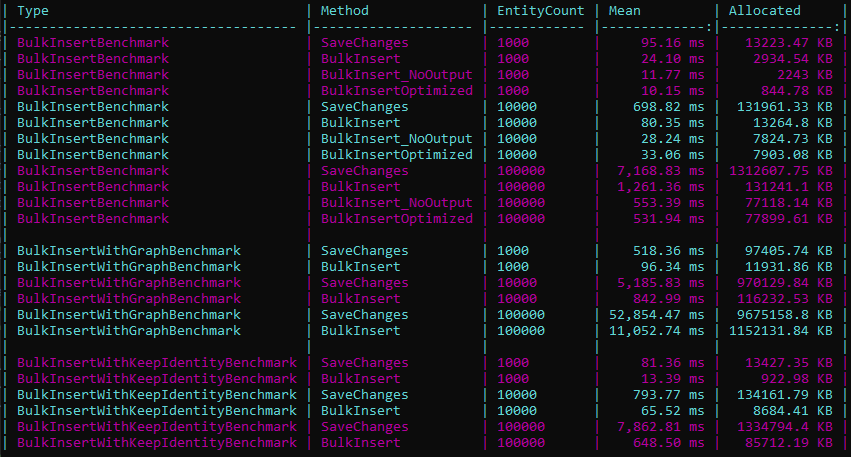Bulk Insert Optimized with Entity Framework ExtensionsInstantly maximize your insert performance in EF Core 10
The BulkInsertOptimized method is a unique feature from Entity Framework Extensions. It’s the fastest way to insert entities in EF Core.
By default, it uses the most efficient SQL because it doesn’t return any values—unless you explicitly ask for them. This allows it to skip the extra steps used by our BulkInsert method, making it even faster.
// @nuget: Z.EntityFramework.Extensions.EFCore using Z.EntityFramework.Extensions; // Easy to use context.BulkInsertOptimized(customers); // Easy to customize context.BulkInsertOptimized(invoices, options => options.IncludeGraph = true);
What advantages does BulkInsertOptimized have over BulkInsert?
No output values by default Since it doesn't return values, it can write directly to the destination table using the
BulkCopystrategy—no need for temporary tables. That means one less step and much better performance.Smart performance tips It can also give you helpful suggestions and best practices to make your insert operations as fast and efficient as possible.
What Are the Performance Gains When Not Outputting Values?
Whether you choose to output values or not when using bulk insert with Entity Framework Extensions, you'll still get major performance improvements.
However, when performance really matters, every millisecond counts—and skipping output values gives you an extra boost.
Below is a benchmark showing the performance for inserting a list of Customer entities, where CustomerID is an identity column:
| Operation | 1,000 Entities | 2,000 Entities | 5,000 Entities |
|---|---|---|---|
| SaveChanges | 325 ms | 575 ms | 1,400 ms |
| BulkInsert (with output values) | 60 ms | 90 ms | 150 ms |
| BulkInsert (without output values) | 30 ms | 50 ms | 90 ms |
| BulkInsertOptimized | 30 ms | 50 ms | 90 ms |
📊 Benchmark Results
The tables above give you a quick idea of the performance gains when using Bulk Insert / BulkInsertOptimized.
But to give you a more complete picture, we also ran extensive benchmarks across all major database providers with BenchmarkDotNet.
👉 Explore detailed results:
- By provider (EF Core):
- By operation (EF Core):
Here’s an example chart for SQL Server – Bulk Insert comparing EF Core SaveChanges vs EF Extensions BulkInsert:

BulkInsertOptimized Recommendations and Performance Hints
The BulkInsertOptimized method from Entity Framework Extensions returns an instance of the BulkOptimizedAnalysis class.
// @nuget: Z.EntityFramework.Extensions.EFCore using Z.EntityFramework.Extensions; public class BulkOptimizedAnalysis { /// <summary>True if the bulk insert is optimized.</summary> public bool IsOptimized { get; } /// <summary>Text summary with all tips to optimize the bulk insert method.</summary> public string TipsText { get; } /// <summary>List of individual tips to optimize the bulk insert method.</summary> public List<string> Tips { get; } }
In short:
- IsOptimized — returns
trueif the bulk insert operation is fully optimized. - Tips — returns a list of reasons why the insert is not optimized.
- TipsText — gives the same tips but combined into a single string for easy logging or display.
To better understand how this class works, take a look at this online example:
// @nuget: Z.EntityFramework.Extensions.EFCore using Z.EntityFramework.Extensions; // Example 1 var analysis = context.BulkInsertOptimized(customers); // Example 2 var analysis = context.BulkInsertOptimized(customers, options => { options.InsertIfNotExists = true; });
- Example 1 is optimized. For SQL Server, a direct
SqlBulkCopyis used—simple and fast. - Example 2 is not optimized. The
InsertIfNotExists = trueoption can't be handled directly bySqlBulkCopy, so it requires extra logic with a temporary table, which slows things down.
The returned tip would be:
"The option
InsertIfNotExists = trueforces the use of a less efficient strategy, resulting in a considerable performance penalty."
🔍 What is Supported?
The BulkInsertOptimized method from Entity Framework Extensions supports all the common scenarios in EF Core — and nearly everything you can do with EF Core and EF6!
- ✅ The latest EF Core version: EF Core 10
- ✅ All previous EF Core versions: EF Core 2 to 9
- ✅ All Entity Framework versions: EF6, EF5, EF4, and EF Classic
- ✅ All major database providers: SQL Server, SQL Azure, PostgreSQL, MySQL, MariaDB, SQLite, and Oracle
- ✅ All inheritance strategies: TPC, TPH, and TPT
- ✅ Complex types / Owned entity types
- ✅ Enums
- ✅ Value converters (EF Core)
- ✅ And much more — even shadow properties!
Bulk Insert Optimized Options
Please refer to the Bulk Insert Options documentation
Troubleshooting
Please refer to the Bulk Insert - Troubleshooting documentation
Limitations
Please refer to the Bulk Insert - Limitations documentation
Conclusion
The BulkInsertOptimized method from Entity Framework Extensions is the fastest and most efficient ways to insert large volumes of data with EF Core.
Unlike the standard BulkInsert method, it skips returning output values by default, allowing it to use a direct SqlBulkCopy strategy and avoid unnecessary steps like creating temporary tables.
But what truly sets it apart is the built-in BulkOptimizedAnalysis class. This feature doesn’t just perform well — it tells you how well it performs, and why. You’ll know right away if your insert is fully optimized, and what to change if it’s not.
If maximum speed matters in your application — and you’re not relying on database-generated output values — then BulkInsertOptimized is the tool you’ve been looking for.
👉 Try it now and experience the performance difference.
ZZZ Projects